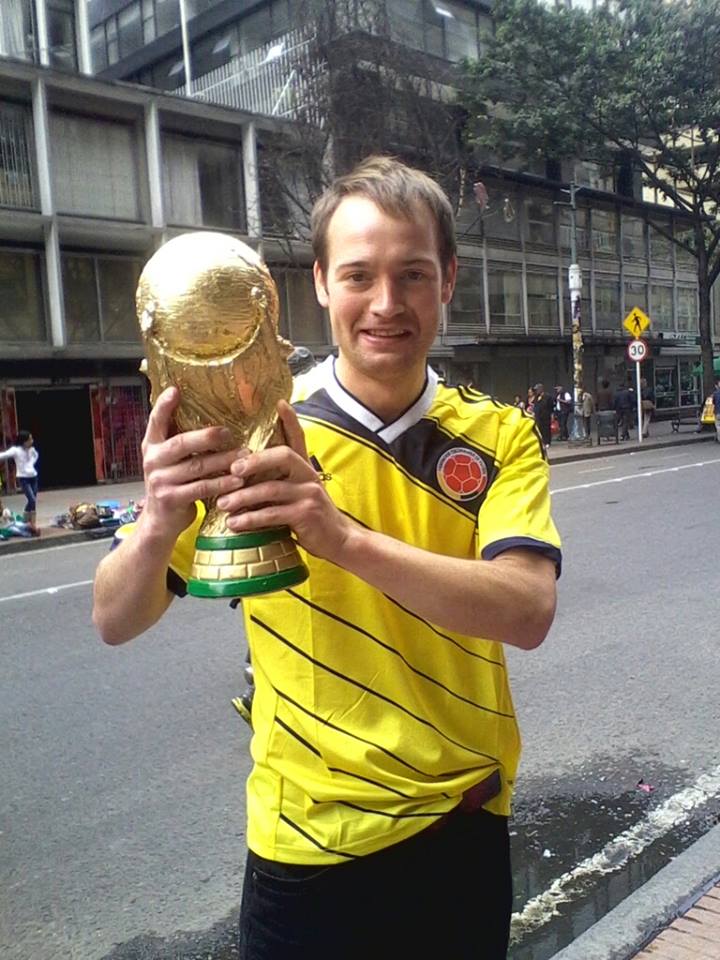Ingresa o regístrate acá para seguir este blog.
@radiobrendan
So the World Cup party rolls on and, thankfully, Colombia is very much still in the mix. These heady times that the country is going through, something mentioned on this blog a few weeks back, are not only continuing but also appear to be increasing in magnitude.

Radamel who? James Rodríguez is lighting up the world in Brazil. (Photo from Facebook.)
Of course, having got to the last eight, should La Selección now fail to go further, the excitement and gushing pride and joy being experienced across the land will take a significant dent.
However, wherever the team finishes – here’s hoping that’s lifting the trophy – Colombians both near and far should, and no doubt will, be immensely proud of the efforts. They ought to be, especially so considering the lads went to Brazil minus their talisman Radamel Falcao, a loss that certainly dampened expectations ahead of the tournament.
In a number of ways, looking at events both on and off the field, this World Cup represents for Colombia what the World Cups of both 1990 and 1994 did for my homeland, the Republic of Ireland.
Granted, unlike the Republic in 1990, this is not Colombia’s debut, but the country was a much different place back in the 90s when they last qualified. This time, like Ireland in the early 90s, there’s a feeling that a bright new dawn is about to break. The football team could be seen not only as a manifestation of that, but also an important part of it.
For one, José Pékerman’s side is, with merit, filling Colombians with an enormous amount of pride and a sense that they are finally being talked about seriously, in a positive manner, on the world stage. (Incidentally, Pékerman is an ‘outsider’, an Argentinian, who is now very much seen as Colombian – á la the Englishman Jack Charlton who managed Ireland in ’90 and ’94.)
Then you have the enormous support the team is getting at the tournament, mirrored by the outpouring of emotion following each victory back home. Colombians, as the Irish did for Italia ’90 and USA ’94, have made their way in droves to Brazil, getting there by any means necessary, sourcing money however they can. Some would even sell their grannies.
Heck, in a further similarity, for two peoples who like to have a beer or two, Dublin’s barmen went on strike for Ireland’s opener in ’94, the victory over Italy, forcing inhabitants of the capital to booze up at home. Here in Bogotá, we have to put up with ley seca (alcohol prohibition) for each game – it hasn’t stopped the drinking or revelling though. Let’s just hope La Selección doesn’t suffer the same fate that befell the Republic in 1990 and lose to the hosts in the last eight.

Colombians are starting to believe that they could get the real World Cup trophy in their hands. Here’s hoping…
This is all happening alongside a more general mood of optimism that seems to be sweeping over Colombia. There are green, or yellow if you like, shoots emerging signalling much better times ahead – economically, politically and socially. For sure, not everyone is sharing in that positivity and there are solid reasons for that, but there is a scent of peace in the air, that a solution to the more than 50 years of internal conflict can be found.
Linked to this, in a financial and social context, things are improving for many Colombians – although tackling the huge inequality that still exists must be one of the chief priorities for re-elected president Juan Manuel Santos.
This is all quite similar to the Republic of Ireland in the early 90s, just before the Celtic Tiger started to roar (remember that?) and politics largely took over from the gun in the Northern Ireland conflict. The island of Ireland was about to experience the good times for a change. Yes, they didn’t last, but you can argue it was better to have them than not.
Thus, for what it’s worth, the advice for Colombia right now from an Irish perspective, both at the World Cup and in general, is carpe diem.
In football terms, you’re doing that pretty good so far. The other things might prove much trickier.
________________________________________
For some other Colombia-Ireland ‘links’, see Colombia and Ireland — a tale of two old Catholic countries.
Reeling in the Years: 1994 gives a nice snapshot of Ireland entering the ‘good times’.
Facebook: Wrong Way Corrigan – The Blog.


Only the writer knows that “in a financial and social context, things are improving for many colombians.” The reality is things are continue getting worst during the second term of president Santos who claims that governments of foreign countries support the peace negotiations with impunity. That is not the case.
- Me gusta
0
- No me gusta
0
ReportarCalifica:
So things are worse now than they were four or five years ago? I think you’ll find many who beg to differ. As mentioned in the piece, it’s far from perfect, but the point is there appear — appear that is — to be signs of things changing for the better. Of course this could be wrong, but I hope I’m not!
Cheers for reading and commenting!
- Me gusta
0
- No me gusta
0
ReportarCalifica: